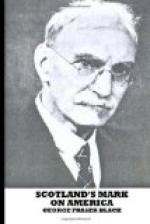CONCLUSION
“It is the knowledge that Scotsmen have done their share in building up the great Republic that makes them proud of its progress and inspires them to add to its glories and advantages in every way. Scotsmen, as a nationality, are everywhere spoken of as good and loyal citizens, while Americans who can trace a family residence of a century in the country are proud if they can count among their ancestors some one who hailed from the land of Burns, and it is a knowledge of all this, in turn, that makes the American Scot of to-day proud of his country’s record and his citizenship and impels him to be as devoted to the new land as it was possible for him to have been to the old had he remained in it. In America, the old traditions, the old blue flag with its white cross, the old Doric, are not forgotten, but are nourished, and preserved, and honored, and spoken by Scotsmen on every side with the kindliest sentiments on the part of those to whom they are alien. Americans know and acknowledge that the traditions and flag and homely speech have long been conserved to the development of that civil and religious liberty on which the great confederation of sovereign republican States has been founded. In the United States, Sir Walter Scott has more readers and quite as enthusiastic admirers as in Scotland, and if Americans were asked which of the world’s poets came nearest to their hearts, the answer would undoubtedly be—Robert Burns.”
LIST OF PRINCIPAL AUTHORITIES REFERRED TO
Appleton. Cyclopaedia of American Biography. New York, 1887-89. 6v.
Bingham. Early History of Michigan. Lansing, 1888.
Breed. Presbyterians and the Revolution. Philadelphia, 1876.
Campbell, The Puritan in Holland, England, and America. New York, 1892.
Casson. The Sons of Old Scotland in America. New York, 1906.
Charlton. The Making of Georgia. Savannah, 1905.
Craighead. Scotch and Irish Seeds in American Soil. Philadelphia, 1879.




